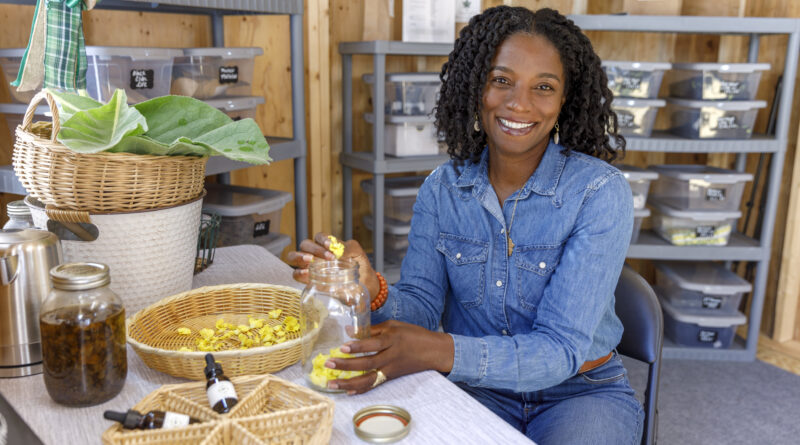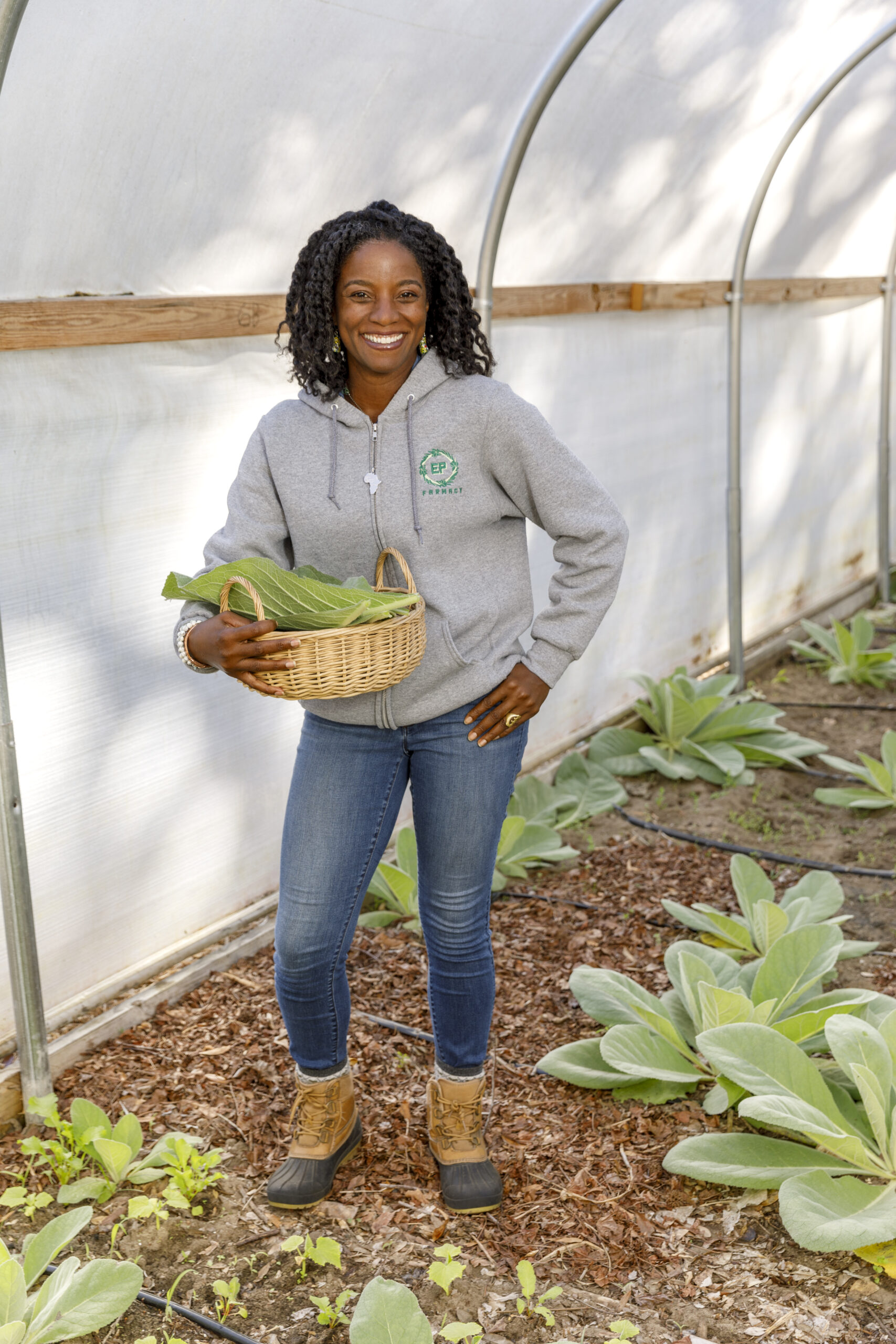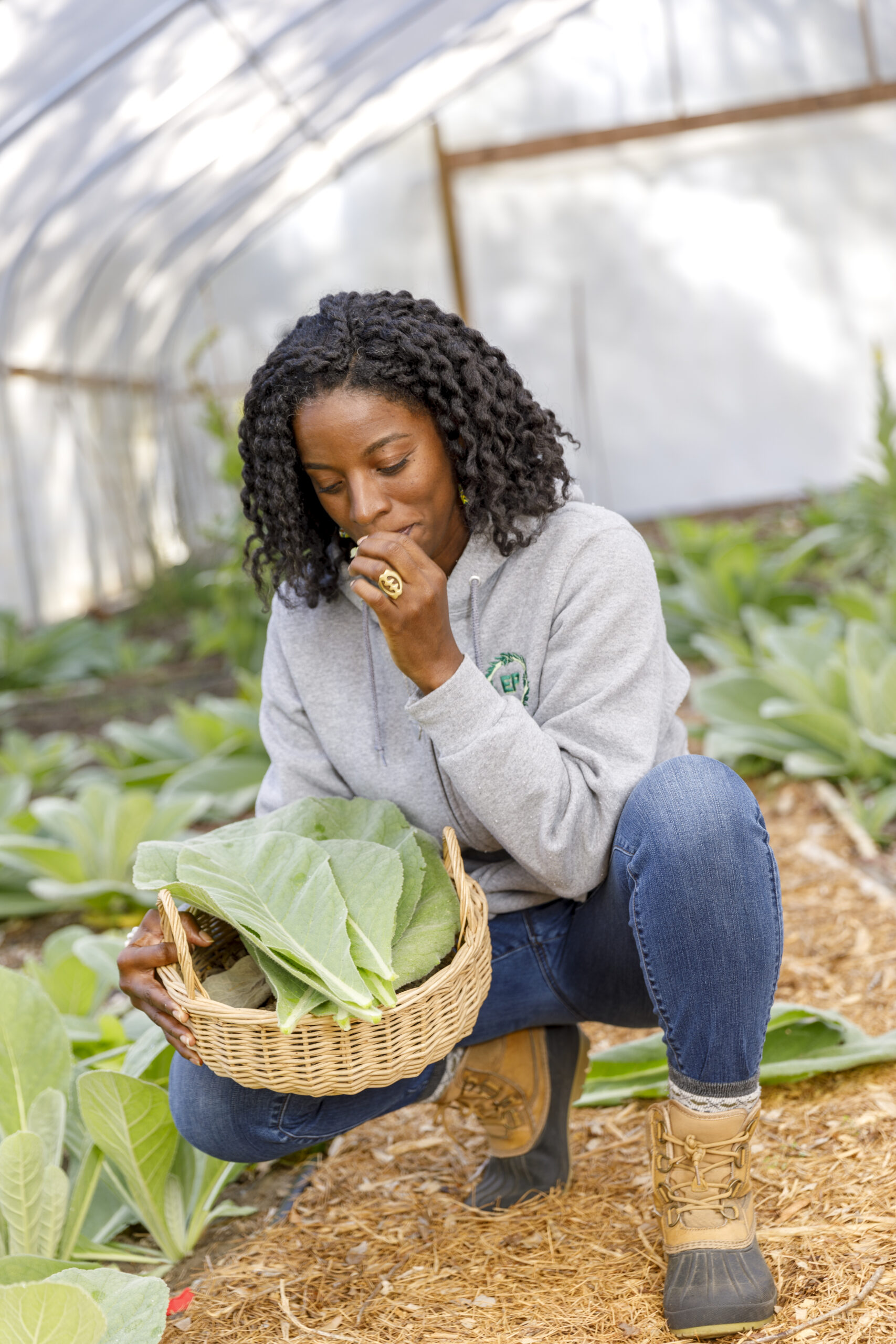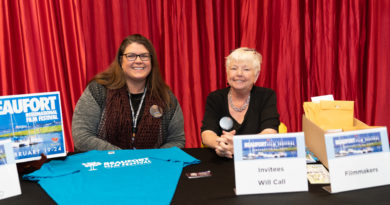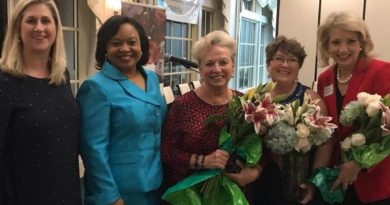Dr. Najmah Thomas
COMING FULL CIRCLE
A Gullah Geechee Doctor Continues a Legacy of Learning and Teaching from the Land
story by NAKEISHA DAWSON-THOMPSON photos by PAUL NURNBERG
![]()
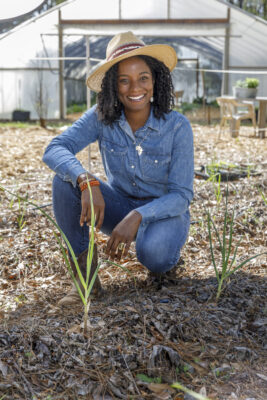
Dr. Najmah Thomas is a native of St. Helena Island, SC, a nationally recognized Gullah Geechee community. Dr. Thomas was educated in the Beaufort County School District, attending St. Helena Elementary School, Lady’s Island Middle School, and Beaufort High School. She is one of nine children, growing up with parents who were firm believers in being connected to the earth and land entrusted to them. Her mother is a native of St. Helena Island, with her family history dating back to the 1800s on the island. Her father is originally from Petersburg, VA. At an early age, Dr. Thomas and her siblings were taught to farm and care for the land, eat healthily, and take care of their bodies.
During the summer of her junior year in high school, life took her to Virginia, where she would begin finding her purpose. This path included dropping out of school in her senior year to pursue the workforce full-time and becoming a single mother at 19. Despite the challenges of being a teenage mother, she continued to work and provide for her sonshine, Paris, whom she calls her “goal.” After being persuaded by Janet Johnson, her high school guidance counselor, she decided to return to school. Janet also insisted she go to college as well. After unsuccessful attempts at community college, she enrolled in Richard Bland, a 2-year college where she thrived. During this time, she began a position with a workforce program in Petersburg — the same federally funded program that she benefited from as an early teen in Beaufort, working under the leadership of Mary Ella Holmes at the Beaufort Redevelopment and Housing Authority. Her counselor at Richard Bland College encouraged her to enroll at the College of William and Mary in Williamsburg, Virginia, where, despite the challenge of working and parenting full-time, as well as often being the only black student in most of her classes, she would later obtain her bachelor’s degree in Public Policy. She quickly realized that earning credentials allowed her to make more money; she would go on to earn her master’s degree in Adult Education and Distant Learning at the University of Phoenix, and, lastly, a PhD in Public Policy and Administration with a concentration in Urban Policy at Virginia Commonwealth University, in Richmond, VA.
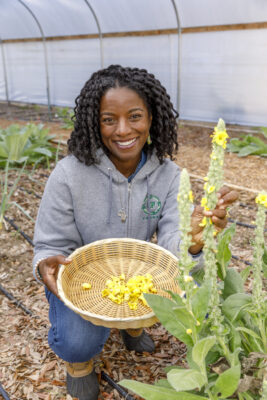 At a family meeting many years ago, Dr. Thomas and her siblings decided they would like to provide for their parents in a way that would honor them and the family/ancestral traditions that were generously passed down to their generation. The siblings recalled growing up on St. Helena Island, and their father, whom they called “Abu,” wore a military fatigue jacket with the letters EP inscribed on the back. EP was short for Earth People. This is how their family’s farm business would inherit its name, Earth People, a reference to the way of life their parents chose before terms like off-grid or sustainable living were popular. During this meeting that turned into a strategic planning session, the siblings discussed: the loss of land, real estate, and property taxes.
At a family meeting many years ago, Dr. Thomas and her siblings decided they would like to provide for their parents in a way that would honor them and the family/ancestral traditions that were generously passed down to their generation. The siblings recalled growing up on St. Helena Island, and their father, whom they called “Abu,” wore a military fatigue jacket with the letters EP inscribed on the back. EP was short for Earth People. This is how their family’s farm business would inherit its name, Earth People, a reference to the way of life their parents chose before terms like off-grid or sustainable living were popular. During this meeting that turned into a strategic planning session, the siblings discussed: the loss of land, real estate, and property taxes.
Every year since 2009, the siblings have done more and more to make their family business idea a reality. Her brother Glenn moved back to St. Helena first and began to renovate a home on the heir’s property. In 2014, Dr. Thomas also moved back to St. Helena Island to help assist with the care of her parents and the family business. She and her siblings poured together to renovate the 1-acre property entrusted to them by their parents, which they now call a “boutique farm.” Dr. Thomas attributes much of their knowledge to their farm mentors, who are also their close relatives, “Uncle Ben and Ruthie Johnson.” Initially, the siblings’ goal was to make enough produce to feed the family, and make enough profit to pay the taxes and keep the land in the family.
Like most farmers, Dr. Thomas maintains other full-time employment. She is an associate professor and the Human Services Program Coordinator at USCB. Dr. Thomas has taught the following programs/areas of study: African American Studies, Human Services, Leadership Development, Nonprofit Management and Program Evaluation, Nonprofit Ethics, Law & Governance, and Fundraising for Nonprofit Organizations. Her research includes, but is not limited to, social and economic equity measurement, program evaluation practices, and evaluating the impact of historical and contemporary public policies on underrepresented populations, with a focus on the Gullah/Geechee community. Dr. Thomas has contributed to many published scholarly articles and research projects, and has facilitated numerous presentations and workshops along the east coast. Dr. Thomas is also well-known for her service to the community both on and off campus.
As a part of meeting the specific research and service requirements for earning tenure at USCB, Dr. Thomas was able to merge her work in the academy and agriculture, cultivating and honing in on the needs of Gullah Geechee farming families. Her research and community service efforts led her to the southern Sustainable Agriculture Research and Education (SARE) program. SARE provided research funding to help identify how Gullah Geechee farming and fishing families maintain their culture, especially when resources are limited. By working with partners, like Queen Quet, Chieftess of the Gullah Geechee Nation, and elder farmers on St. Helena Island, Dr. Thomas has been able to build her research around the things that are important to her community as they continue to identify ways to support the next generation in sustainable farming — connecting culture to agronomy via Gullah Geechee “Agro-culture.”
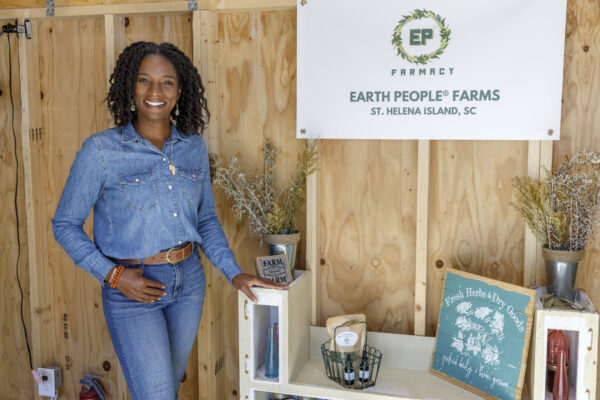
This research is directly related to the work Dr. Thomas is regularly engaged in as a part of the Gullah Geechee community and her family farming roots. Since returning to St. Helena in 2014, Dr. Thomas has worked with her siblings to help Earth People® Farms grow into a blossoming family farming business. Her brother Glen is the President and Chief Farm Officer, and her sister Nature serves as the Vice President for research and development, assisting the business in implementing new and improved production methods, such as their all-season high tunnel. Earth People® Farms launched a local farmer’s market with Daryl Orage, a well-known farmer in the community and Dr. Thomas’ significant other. Daryl was instrumental in their decision to plant okra as a cash crop, and the okra leaf has now become their primary business logo. Earth People® Farms has gained support from the Natural Resources Conservation Service (NRCS), the SC Department of Agriculture, and the SC Black Farmers Coalition. Dr. Thomas expressed that doing this research and putting their “hands to the plow” has heightened the awareness of how their “African ancestors came here with specialized agricultural knowledge and skills that helped build empires on crops, such as Carolina Gold rice.”
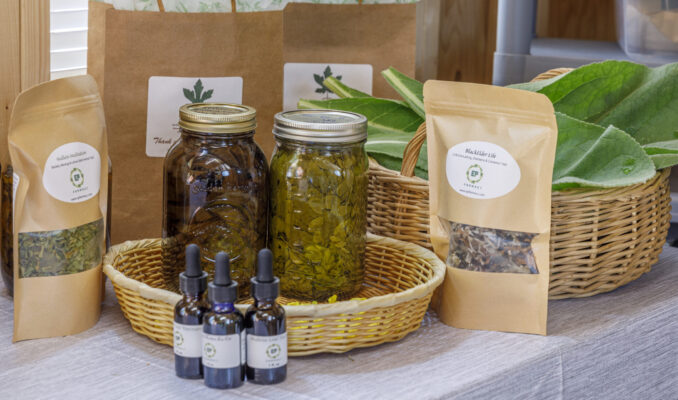
The Thomas siblings are excited about their newly launched EP Farmacy after successfully participating in a business plan competition through ACRE, a SC Department of Agriculture branch.
Their mother pointed out how much mullein herbs had grown in the high tunnel, and she reminded them how valuable mullein is to the Earth People’s way of life. The farmacy currently has the following on hand: mullein ear oil and tinctures, mullein, life everlasting, and moringa tea blends. Moringa is known as the miracle plant in many African diasporic communities, and the family was introduced to this herb by way of Carmichael, Daryl Orage’s son. Gullah Geechee elders have been using the land to promote health and wellness before Western medicine became streamlined. “Gullah Geechee people would say go back to old landmark — or go back and reclaim some of the traditional ways that kept our people strong and helped them to survive some of the most challenging times, including the chattel enslavement and Jim Crow segregation.”
EP Farm is focused on ensuring the next generation can see their way to a different kind of farming. Knowing there is more than one way to do agriculture is essential. As the world changes, the next generation may be more inclined to continue the work, take care of the land, and keep land in the family to honor the generations that laid the foundations.
For more information on Earth People® Farm, visit their website earthpeoplefarms.com.

